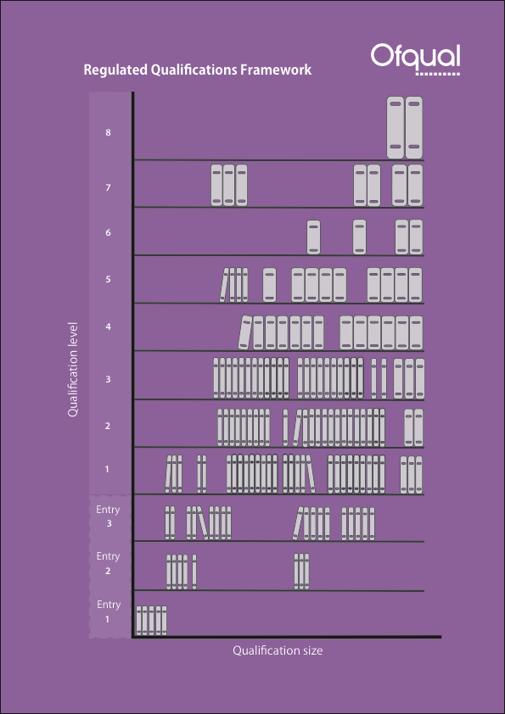RQF Levels Explained
Verity Sangan
Last Update vor 4 Jahren
The Regulations Qualification Framework (RQF) was introduced in 2015 and replaced the Qualifications and Credit Framework (QCF). The QCF replaced the previous National Vocational Qualification (NVQ) programme.
Within England, Wales, Northern Ireland, and the Channel Islands, there are 9 levels of regulated qualification. These range from entry level through to level 8 study. As you go up the levels of study, the work gradually becomes more difficult, and your level of understanding is expected to increase.
A full rundown of all qualifications available from entry level through to level 8 can be found here.

Awards, Certificates and Diplomas
Within each type of level of qualification, there are different sizes of qualification: Award, Certificate and Diploma.
Awards are quite specific in what they teach. On completion, a learner will have additional skills which may further their knowledge or qualify them to undertake additional tasks in the workplace.
Certificates offer more in-depth knowledge than Awards.
Diplomas offer the most comprehensive knowledge out of these three options.
Awards, Certificates and Diplomas can be studied at any level. Within each type of qualification, you might study at different levels. You may also undertake units of an Award, Certificate or Diploma as a standalone unit, without completing the entire qualification.
Qualification Size and Time to Complete
Different qualifications will have different credits attached to them. All of the credits must be achieved in order to gain the qualification.
On average, it takes around 10 hours to complete a credit.
The Level 3 (RQF) Diploma in Adult Care has 58 credits which must be achieved in order to be awarded with the qualification. Therefore, it will take an average of 580 hours to complete the qualification.
Awards are smaller than Certificates, which are smaller than Diplomas. Therefore, it takes less time to complete an Award than it does a Certificate. Equally, it takes less time to complete a Certificate than a Diploma. However, different qualification topics vary the number of credits which are required to obtain that qualification. Therefore, you should look at the credit value to calculate the estimated learning time for that qualification.
Often, qualification titles refer to the length of time it will take to complete the qualification. They are not always progressional. Therefore, you should undertake the qualification which meets the right level for you, depending on the time you have to dedicate to your study.
